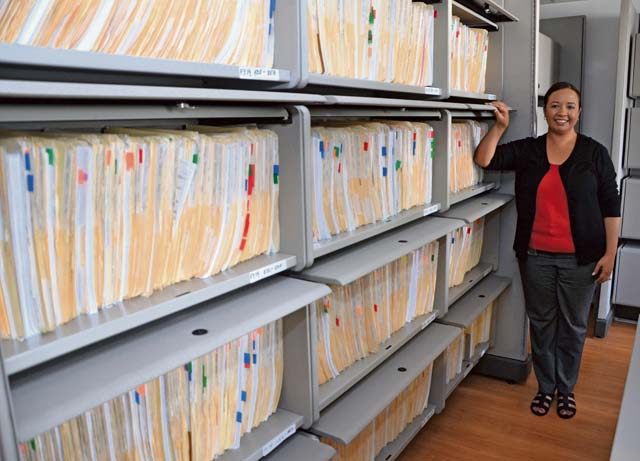
SEMBACH KASERNE, Germany — Processing Exceptional Family Member Program family travel request cases used to take weeks and involved file cabinets filled with paperwork, but not anymore.
With a new system that began on May 1, all EFMP files received by the Europe Regional Medical Command are now processed digitally, cutting both processing time and paperwork.
The command’s EFMP office processes all family travel requests for military members and civilian employees with assignments to Europe.
“Any time a family member has a chronic condition, they are enrolled in the Exceptional Family Member Program,” said Leslie Garcia, ERMC EFMP director. Those conditions could include anything from diabetes and asthma to multiple sclerosis and autism.”
The goal of the EFMP is to ensure that family members with special needs will be provided the proper care in their assigned community, whether at an Army health clinic or by host nation providers. Each request is screened by the EFMP office and a medical provider before a recommendation is made to U.S. Army Human Resources Command as to whether or not the family member’s special needs can be supported.
Before May 1, each case or request was printed out, processed at the EFMP office at Sembach Kaserne, and then sent by courier once a week to Landstuhl Regional Medical Center to be screened by the provider before being returned. The provider would receive an average of 70 cases each week.
Once processed, the cases and requests would be filed for five years before they could be destroyed.
Garcia and ERMC Family Services Chief Capt. Edward Donnarumma, worked with ERMC Information Technology and Installation Management Command Europe to come up with the technical infrastructure which allows EFMP packages to be processed digitally rather than manually.
“Now we receive a hand-signed family travel request by email instead of printing it out,” Donnarumma said. Once the case is reviewed by the EFMP office and any concerns highlighted and annotated, the file is placed on a restricted and encrypted network drive where it can be accessed immediately by the provider, cutting processing time.”
The new system also means the provider can still review the files even if he’s working from another location, Donnarumma said.
The digital system not only makes processing cases faster, but it makes pulling reports easier as well. Instead of having to go back and pull paper files, the system now collates most of the information automatically.
While most of the new system will be transparent to the military and family members being served by it, faster processing times will mean fewer delays for families waiting for word on their new assignment.







